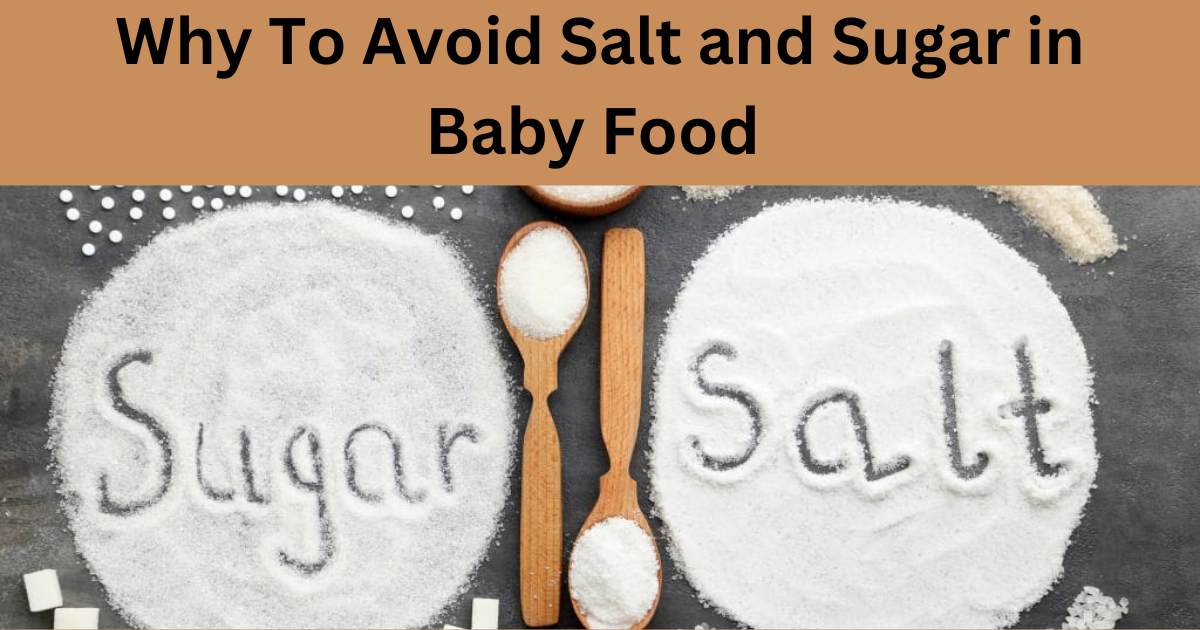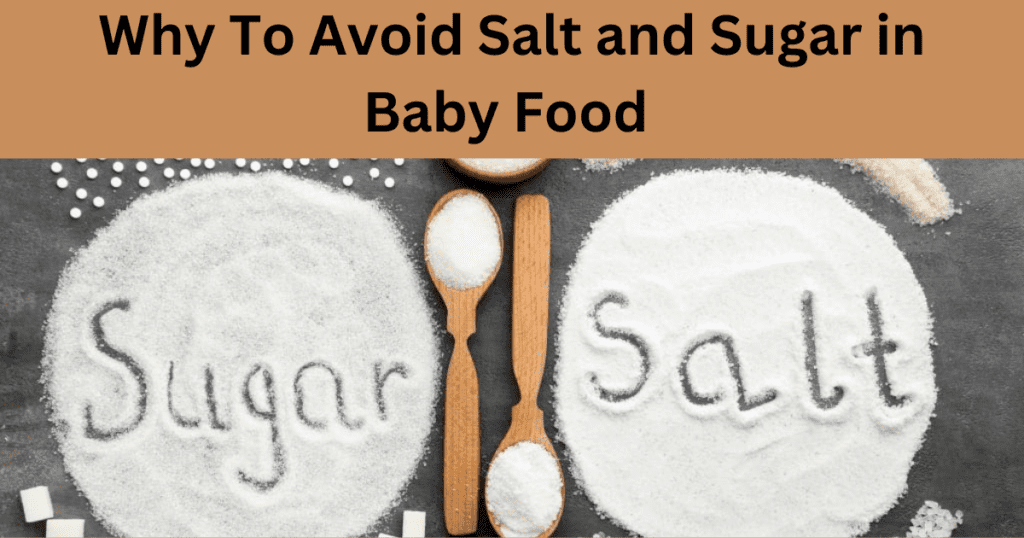Hello Mommies, welcome to Mom Kid Be Healthy blog. Let us discuss a very important topic: why to avoid salt and sugar in baby food, which we sometimes ignore. We just think that the child is eating a very small amount of food, so we don’t bother about it. We just think about how a very small amount of food affects a baby’s health. However, the actual reason is something else. I will share everything about why to avoid salt and sugar in baby food is important. Introducing salt and sugar to a baby’s diet is a crucial topic that demands careful consideration, given the distinctive nutritional requirements of infants in comparison to adults.
Some essential points to keep in mind on why to avoid salt and sugar in baby food:
1. Salt (Sodium):
- Infants below the age of 1 have minimal salt requirements due to underdeveloped kidneys that struggle to process excess sodium.
- Breast milk and formula inherently contain the appropriate sodium levels for a baby’s needs, making adding extra salt to their diet unnecessary.
- Elevated sodium intake during infancy has potential long-term health implications, such as elevated blood pressure.
2. Sugar:
- The introduction of sugar to a baby’s diet should be approached with caution. Added sugars, commonly present in confectioneries and sugary beverages, lack nutritional benefits and can contribute to obesity and dental problems.
- Natural sugars found in fruits are a healthier alternative, but it is still imperative to monitor the quantity and emphasize a diverse array of nutrient-rich foods.
3. Hydration:
- Breast milk or formula provides sufficient hydration for infants under 6 months.
- The introduction of water can commence with the introduction of solid foods, but excessive consumption should be avoided.
What is monosodium glutamate?
Monosodium glutamate, also known as MSG, is the sodium salt of glutamic acid. It is an amino acid among the 20 fundamental building blocks of proteins. Glutamic acid occurs naturally in our various foods, like tomatoes, cheese, mushrooms, and specific grains. MSG represents a sodium salt derived from this naturally occurring amino acid. It is included as a flavor enhancer in various processed and restaurant-prepared food items.
Can we include MSG in a baby’s diet?
It is always advisable to be careful while including MSG in a baby’s diet. Though MSG is considered safe for babies, it should always be given within limits. Infants have very sensitive systems, and if we give them excess MSG, then their kidneys will struggle with the excess amount of sodium. Try to emphasize natural, nutrient-rich foods and avoid unnecessary additives in their diet. Whenever you are in doubt, ask your pediatrician, and then start adding new food elements to your baby’s diet. Keep in mind that whatever new element is being introduced to babies, it should not compromise their health.
Guidelines for Introducing Solids:
- The American Academy of Pediatrics (AAP) advocates for exclusive breastfeeding for approximately the first 6 months, followed by the gradual introduction of iron-rich solid foods.
- When incorporating solid foods, it is advisable to begin with single-ingredient items, progressing gradually to mixed foods. This facilitates the monitoring of potential allergies and sensitivities.
- Refrain from incorporating salt or sugar into homemade baby food, and opt for single-ingredient preparations to maintain control over ingredients.
When can I start adding salt to my baby’s food?
After your baby’s first birthday, it is safe to add salt to your baby’s diet. The reason why to avoid salt and sugar in baby food below 1 year of age has already been explained above. Natural, whole, and fresh foods should be the top priority, as they contain less salt as compared to processed foods. If you are a home-made food lover and want to instill the same habit in your baby, then adding a pinch of salt to the whole dish is safe to enhance the taste of the dish. Always avoid adding direct salt to your child’s food, and make a habit of reading the labels when using condiments to flavor foods, as they often contain lots of sodium.
How much sodium can a baby have each day?
The adequate amount of salt intake recommendation from the NASEM’s Committee is as follows:
- Children aged 0–6 months can have 110 mg/day.
- Children aged 7–12 months can have 370 mg/day.
- Children aged 1-3 years can have 800 mg/day.
- Children aged 4–8 years can have 1000 mg/day.
Health consequences of having excess sodium:
1. Hypertension
Recently, the Canadian data signifies that 7% of children 6 to 17 years of age now have hypertension on either the borderline or over. If sodium can be reduced by diet, then it is associated with small reductions in systolic BP in infants and children. You can get more information on the website of the National Library of Medicine.
2. Obesity
One study suggests a link between high sodium intake and obesity in children. Those children who consume more sodium or salt may also take more sugar-sweetened drinks. Consumption of higher-sugar-sweetened beverages can lead to excess energy intake. In observational studies, an additional 1 gram per day of sodium has been associated with 23% to 28% of overweight or obese people.
Consulting with a pediatrician:
Seeking guidance from a pediatrician about why to avoid salt and sugar in baby food before introducing new foods, including those containing salt or sugar, is imperative. They can offer personalized advice based on the baby’s growth, development, and any specific health considerations.
Conclusion:
Ensuring a healthy beginning for babies involves providing a well-balanced and nutritious diet, keeping in mind why to avoid salt and sugar in baby food, devoid of unnecessary additives such as salt and sugar. Prioritizing whole, natural foods and consulting healthcare professionals will contribute significantly to the overall well-being of the infant.
FAQs:
Ques.1: Why is sugar and salt not good for babies?
Babies kidneys are underdeveloped. Their kidneys struggle to process excess salt. Their sodium requirements can be easily met with mother milk/ breast milk or formula milk.
Ques. 2: When can I introduce sugar and salt to my baby?
It is recommended to introduce it after a baby’s first birthday, and that too within limits.
Ques. 3: Is cheese too salty for babies?
Do not sprinkle extra salt on the cheese. Always read the ingredients and the proportion label while buying it from the market.
Ques. 4: How can I sweeten my baby food without sugar?
There are many remedies that you can prepare without adding sugar. You can go for recipes like carrot oats, carrot daliya, sweet potatoes, etc. These vegetables are naturally sweetened.
Ques. 5: Why can’t babies have strawberries?
Yes, your child can have strawberries thoroughly washed in salt water and then again washed with simple water under adult supervision.

